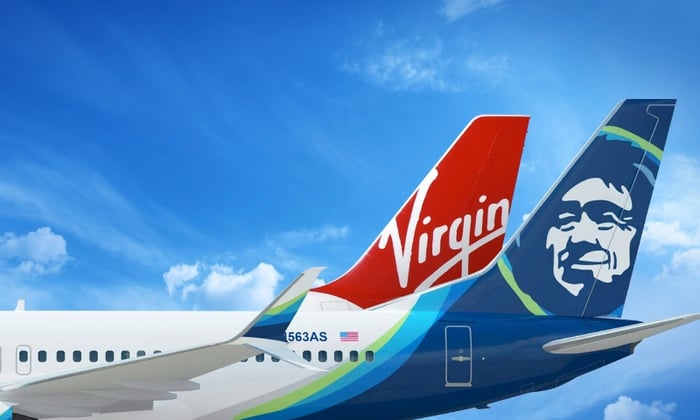Late last year, Alaska Air (ALK 2.15%) completed its acquisition of West Coast rival Virgin America. From a strategic perspective, the deal made sense because it catapulted the combined company into a leadership position in the West Coast air travel market.
From a fleet management perspective, the merger was less ideal. Alaska Airlines has historically operated an all-Boeing (BA 2.12%) mainline fleet, whereas Virgin America exclusively flew Airbus (EADSY 1.28%) A320-series planes.

Alaska Airlines and Virgin America operate different aircraft types. Image source: Alaska Air.
Since the merger, Alaska's management has been studying whether to continue operating a mixed fleet of Boeing and Airbus planes going forward versus returning to an all-Boeing 737 fleet. (Going to an all-Airbus fleet is not an option under consideration.) At an event last week, Alaska Air CEO Brad Tilden indicated that the company is leaning toward the all-Boeing option -- and that's no surprise.
All-Boeing or mixed fleet?
Alaska Air has said it will announce a decision on its long-term fleet strategy by the end of 2017. At the company's investor day back in March, management described the key factors that could impact this decision.
On one hand, keeping an Airbus subfleet would cost about $20 million to $25 million annually, according to company estimates, mainly because of lower pilot productivity and higher overhead costs. On the other hand, Alaska Air might be able to negotiate lower aircraft purchase prices by forcing Airbus and Boeing to compete for each and every sale.
Whatever the ultimate decision, Alaska has indicated that the Airbus fleet will remain for many years to come. The vast majority of Virgin America's fleet is leased, with most of those leases set to expire between 2021 and 2024. It would be prohibitively expensive to terminate those leases early.
Boeing has the advantage -- and it just got bigger
Alaska Air is leaning toward retiring Virgin America's fleet and becoming an all-Boeing carrier again, according to CEO Brad Tilden's comments at a business breakfast in Seattle last week. Tilden acknowledged that Alaska still had some work to do on the mechanics of replacing a significant proportion of its fleet, but said that the Airbus planes probably wouldn't be around forever.

Alaska Airlines will probably return to an all-Boeing 737 mainline fleet. Image source: Alaska Air.
One big reason is loyalty. Alaska Air is headquartered in Seattle and has its largest hub there. Despite cutbacks in recent years, the Seattle area remains the main production base for Boeing and many of its key suppliers. This makes it natural for Alaska Air and Boeing to be partners.
In addition, the launch of Boeing's 737 MAX 10 gives Alaska Air much less need for an A320-series subfleet. Virgin America recently began to "test-drive" the popular Airbus A321neo, which has superior unit costs compared to the Boeing 737 MAX 9: until recently, the closest competitor offered by Boeing. By contrast, the 737 MAX 10 will be roughly equivalent to the A321neo in terms of capacity and unit costs, eliminating one key benefit of having an Airbus subfleet.
Can Alaska Air and Boeing strike a deal?
Despite having gained some ground this year, Boeing's 737 order backlog remains well behind Airbus' A320-series backlog. As a result, Boeing should be motivated to give Alaska Airlines excellent pricing for an order to cover most of the carrier's growth and replacement needs for the next decade.
If Boeing is willing to offer big enough discounts, there wouldn't be much reason for Alaska Air to stick with its Airbus subfleet. Including lower ownership costs, reduced operating costs (from upgrading to a new generation of jets), and the benefits of having a single fleet type, Alaska could potentially save about $200 million annually by fully replacing the Airbus fleet with new Boeing 737 MAX aircraft.
Alaska Air probably won't be ready to announce a final fleet decision until sometime in the fourth quarter. Still, it's increasingly clear what the outcome will be -- a big order for Boeing and a steady phase-out of Virgin America's A320-series fleet beginning in a few years.





